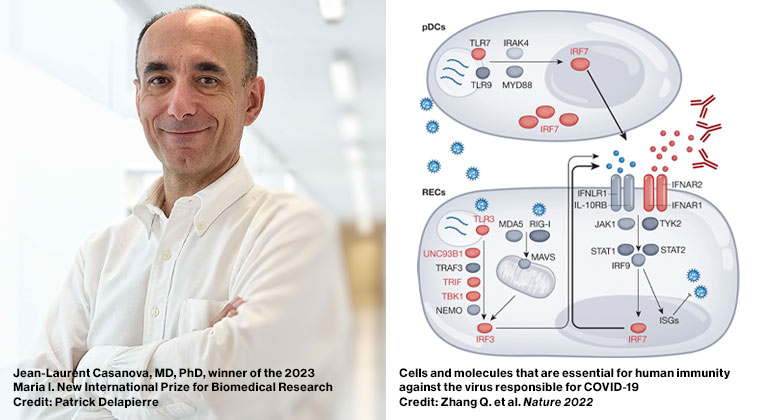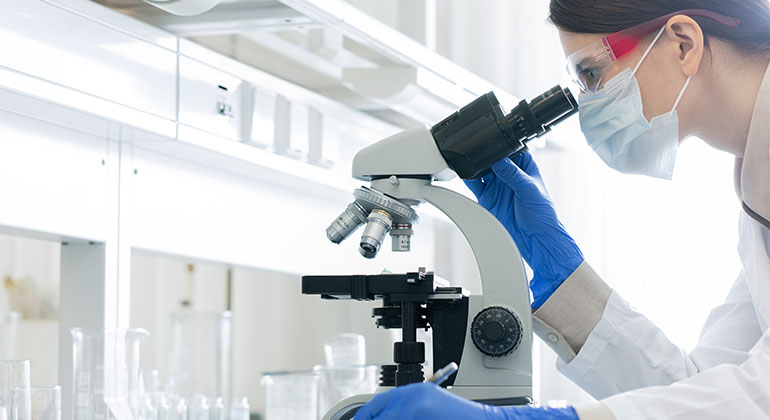Mount Sinai Researchers Identify Way to Predict and Prevent Damage in Donated Kidneys
A multicenter team of researchers led by Barbara Murphy, MD, of the Icahn School of Medicine at Mount Sinai has identified a panel of genes which can help predict whether a transplanted kidney will later develop fibrosis, an injury which can cause the organ to fail. Their results were published in the July 21 edition of Lancet.
Researchers in the Genomics of Chronic Allograft Rejection (GoCAR) study obtained biopsy samples from transplanted kidneys three months and twelve months after transplantation. Using microarray, a method by which the expression levels of a large numbers of genes or proteins can be measured simultaneously, the researchers determined which genes were correlated with biopsy samples which had an increased Chronic Allograft Damage Index (CADI) score at the 12-month biopsy. The CADI score is a measure of the level of fibrosis in the transplanted kidney. The researchers then narrowed the genes down to a predictive gene set that identified patients at risk for decline in renal function and loss of the transplanted kidney beyond one year. The rate of correlation of the identified gene set with damage was greater than the clinico-pathological variables currently used in practice to identify kidney transplant recipients at risk of allograft damage and loss.
“This is the first finding of its kind,” said Barbara Murphy, System Chair of Medicine for the Mount Sinai Health System and Murray M. Rosenberg Professor of Medicine (Nephrology) at the Icahn School of Medicine at Mount Sinai, and the lead investigator on the study. “By helping us better understand the causes of damage to transplanted kidneys, this study has the potential to change how we monitor and manage all renal transplant patients.”
“The study offers the potential to identify renal transplant recipients at risk for a loss of the new organ prior to the development of irreversible damage,” said Dr. Murphy. “This would mean that doctors might eventually have the opportunity to change the therapeutic treatment approach in order to prevent fibrosis from progressing at all.”
Other institutions involved in the study include Westmead Hospital, Sydney, Australia; Northwestern University; Massachusetts General Hospital; Brigham and Women’s Hospital; University of Michigan; and University of Wisconsin.
About the Mount Sinai Health System
Mount Sinai Health System is one of the largest academic medical systems in the New York metro area, with 48,000 employees working across seven hospitals, more than 400 outpatient practices, more than 600 research and clinical labs, a school of nursing, and a leading school of medicine and graduate education. Mount Sinai advances health for all people, everywhere, by taking on the most complex health care challenges of our time—discovering and applying new scientific learning and knowledge; developing safer, more effective treatments; educating the next generation of medical leaders and innovators; and supporting local communities by delivering high-quality care to all who need it.
Through the integration of its hospitals, labs, and schools, Mount Sinai offers comprehensive health care solutions from birth through geriatrics, leveraging innovative approaches such as artificial intelligence and informatics while keeping patients’ medical and emotional needs at the center of all treatment. The Health System includes approximately 9,000 primary and specialty care physicians and 11 free-standing joint-venture centers throughout the five boroughs of New York City, Westchester, Long Island, and Florida. Hospitals within the System are consistently ranked by Newsweek’s® “The World’s Best Smart Hospitals, Best in State Hospitals, World Best Hospitals and Best Specialty Hospitals” and by U.S. News & World Report's® “Best Hospitals” and “Best Children’s Hospitals.” The Mount Sinai Hospital is on the U.S. News & World Report® “Best Hospitals” Honor Roll for 2024-2025.
For more information, visit https://www.mountsinai.org or find Mount Sinai on Facebook, Instagram, LinkedIn, X, and YouTube.
Mount Sinai Researchers Discover Treatment Option for Rare Genetic Disorder
Aug 04, 2020 View All Press ReleasesMount Sinai Researchers: Why COVID-19 May Be Less Common in Children Than Adults
May 22, 2020 View All Press ReleasesGlobal Team Enables Child With a Fatal Genetic Disease to Recover
Jan 16, 2020 View All Press ReleasesIntegrated, Multi-“omic” Studies of Asthma Could Lead to Precision Treatment
Jul 02, 2019 View All Press ReleasesMount Sinai Researcher Bruce Gelb Named President-Elect of the American Pediatric Society
Apr 04, 2017 View All Press ReleasesMount Sinai Researchers Receive Major NIH Award for Autism Genetics Research
Apr 03, 2017 View All Press Releases
